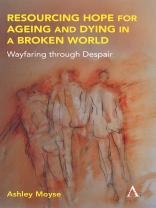For those captive to the broken world of late modernity, wherein ageing and dying persons become vulnerable to despair, this book offers a diagnostic of such despair. It also resources the practices of a realistic, humanising hope that might enable a strength for person to journey with and for others, together, through such despair. Thus, by addressing the aetiology of despair experienced by people confronting ageing, frailty and dying, and drawing upon the writings of Gabriel Marcel, among others, Ashley Moyse reveals the problematic life of a broken world with its functionalising metaphors, instrumentalising reasoning and objectifying desires that offer no hope at all. It is a broken world where despair generates behaviours that anticipate suicide or other, often tragic, outcomes that impede or greatly curtail or even completely inhibit human flourishing. Resisting despair, but living through it, Moyse presents the activity of the moral life, demonstrating a way persons might be resourced through an intersubjective and reflective pedagogy, with its habits or practices that enable a humanising hope, liberating human beings to become those readied to confront the actualities of human living and dying, and encouraged to grow and develop as ‘wayfarers’, hopefully.
Inhaltsverzeichnis
Acknowledgements; Introduction. Diagnosing Despair. Resourcing Hope; Chapter 1. Pain, Suffering and the Broken World; Chapter 2. Ageing ‘As One More Opportunity to Fail’; Chapter 3. Dying Deceived by Despair in Disguise; Chapter 4. Wayfaring through Despair, Practicing Hope; Afterword by Lydia S. Dugdale; Bibliography; Index.
Über den Autor
Ashley Moyse is Assistant Professor of Medical Ethics and Mc Donald Scholar in the Columbia Center for Clinical Medical Ethics at Columbia University Vagelos College of Physicians & Surgeons.







![Cover von Brian Schrag & Julisa Rowe: Community Arts for God's Purposes [Chinese] 貼近神心意的社群藝術 Cover von Brian Schrag & Julisa Rowe: Community Arts for God's Purposes [Chinese] 貼近神心意的社群藝術](https://static.worldofdigitals.com/thumb_webp/740/9781645083740.webp)




